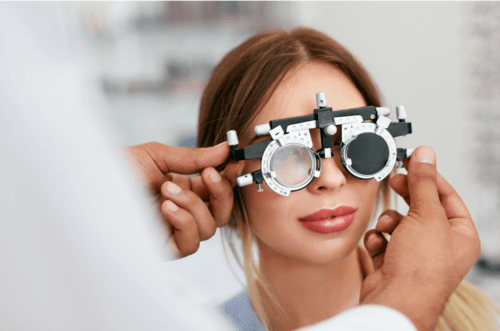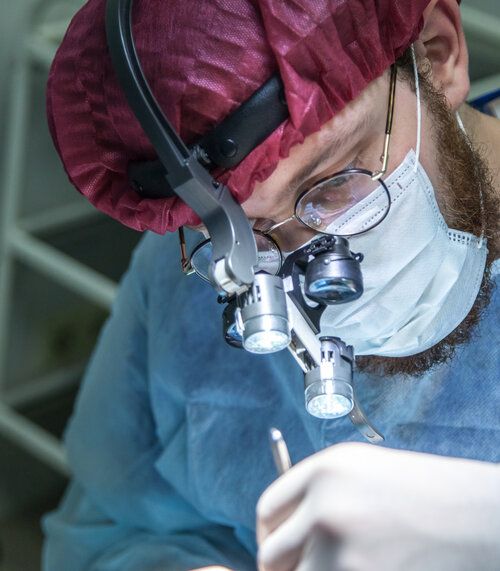The Quintessential Guide to Choosing An Optometrist, Ophthalmologist, or Optician
What’s the difference between an optometrist, ophthalmologist and optician?
Here’s a breakdown of what each of these eyecare professionals provide:
Optometrist
- Eye health education
- Diagnosis and medical treatment of eye conditions not requiring surgery
- Glasses and contact lens prescriptions
- Post-surgical eyecare follow-up
Ophthalmologist
- Eye health education
- Diagnosis and treatment of all eye conditions
- Surgical interventions like those for cataracts or glaucoma
- Rehabilitation and post-surgery eyecare
Optician
- Answer general eyecare questions
- Complete office duties such as helping customers choose frames and contacts
- Measure, fit, and adjust eyeglass frames and lenses
- Receive and fill eye prescriptions from optometrists and ophthalmologists


Should you see an optometrist, ophthalmologist, or optician? Who you should make an appointment with all depends on what your eyes need. When it comes to your eye health, finding the right eyecare professional to fit your needs is crucial. Nanodropper’s mission is to help you take back control of your eye health, so we’re here to help! Their titles may seem dizzying, but we at Nanodropper have put together a straightforward guide displaying which eyecare professionals will best meet your needs.
What Does an Optometrist Do?
The simple definition: An optometrist (OD) is an eye doctor that can do all the basics for you. Examine, diagnose, and treat your eyes for routine care. If you need contacts or glasses, this is who you’ll see. They can also treat uncomplicated cases of eye conditions before you’re referred to an ophthalmologist.
“Even if you don’t have vision insurance, annual eye exams are important for early eye disease detection. In most of the USA, for under $100, you can see your local optometrist for a full ocular examination. If an eye disease is present, your optometrist can treat your condition. Only if you need surgery or more specialized care will you need to be referred to a specific ophthalmologist (glaucoma specialist/retinal specialist/neuro-ophthalmologist, etc..),” says Dr. Thanh Pham, an Optometrist serving the Greater Seattle Area.
Services Offered
An optometrist is who you will see for your annual eye exams. They play an important role in helping you maintain your eye health by providing…
-
Eye health education
-
Diagnosis and treatment of uncomplicated eye conditions
-
Glasses and contact lens prescriptions
-
Post-surgical eyecare follow-up

Training
According to the American Academy of Ophthalmology, optometrists attend optometry school for four years and have the option to continue on to complete a one-year residency training. They must also take a national board certification test.
Here are just a few of the subjects covered in the optometry curriculum:
-
Sensory processing
-
Vision sciences and therapy
-
Practice and healthcare management
-
Contact lenses
-
Optics
-
Pediatric and special population optometry
-
Behavioral vision and learning
-
Vision function
When an optometrist graduates, they receive a doctor of optometry degree, otherwise known as an OD.
What Does an Ophthalmologist Do?

The simple definition: An ophthalmologist (MD) is a medical doctor who can perform medical and surgical interventions for all eye conditions. If you need cataract surgery, glaucoma surgery, cancer of the eye, have a complicated case of eye conditions, or require more specialized eye care, this is who you’ll see.
However, seeking routine care is the best way to avert disaster in the long run. Dr. Jordan Stanley, MD, an ophthalmologist specializing in glaucoma and cataract care, shared why it is important to receive a comprehensive eye exam.
“Following the AAO recommendations for getting a comprehensive exam is important, as many serious eye conditions benefit from early detection and they often do not cause noticeable symptoms in the early stages of the disease.”
If you don’t have any risk factors, the American Academy of Ophthalmology recommends having a comprehensive eye exams at the following intervals based on your age:
-
Under 40 Every 5 – 10 years
-
40 – 54 Every 2 – 4 years
-
55 – 64 Every 1 – 3 years
-
65 or older Every 1 – 2 years
Services Offered
While you are more than welcome to see an ophthalmologist for the same services as an optometrist, an ophthalmologist takes care of the more serious eye needs, including surgery. This can include surgeries like those for cataracts or glaucoma. They also will help you with the rehabilitation and post-surgery eyecare.
Training
Ophthalmologists require four years of medical school, where they will receive either a Doctor of Medicine (MD) or Doctor of Osteopathic Medicine (DO). Then they complete an additional four to seven years of residency specifically for ophthalmology. In the United States, they must complete a bachelor’s degree and take the MCAT before medical school.
The American Academy of Ophthalmology states that after completing residency, “about 40 percent of students go on to a one- or two-year fellowship program to concentrate training and experience in a particular subspecialty. This is an additional five to six years of training following medical school for those who complete a fellowship program.”
Ophthalmology fellowships/ sub-specialties include:
-
Cornea and External Disease
-
Glaucoma
-
Neuro-Ophthalmology
-
Ophthalmic Pathology
-
Ophthalmic Plastic Surgery
-
Pediatric Ophthalmology
-
Vitreoretinal Diseases
What Does an Optician Do?
The simple definition: An optician is a technician who is trained to fit contact lenses, eyeglass lenses, and frames. They often work in a vision care store or an optometrist’s office and will be the first person you come across when seeking vision care.

“If you’re experiencing issues with your current frames or contacts, opticians can be the first point of contact for you to get help. Oftentimes, they’ll be available for you without an appointment,” says Allisa Song, CEO of Nanodropper. “They can be a great resource if you’re wondering if you should make an appointment to follow-up with your eyecare physician.”
Services Offered
Opticians play an important role in meeting your eye needs and keeping vision care centers running smoothly. While they are not allowed to diagnose or treat eye diseases, they can do the following…
-
Answer general eyecare questions
-
Complete office duties such as helping customers choose frames and contacts
-
Measure, fit, and adjust eyeglass frames
-
Receive and fill eye prescriptions from optometrists and ophthalmologists
Training
According to Healthline, an optician does not need a formal degree, but they can complete a 1- to 2-year program to receive a certification or associates in ophthalmic dispensing. Opticians often “become certified through an in-house apprenticeship under an ophthalmologist or optometrist.”
Paraoptometrics

The simple definition: A certified paraoptometric is another important member of the vision care team. According to the American Optometric Association, they generally handle the front desk tasks like scheduling appointments, calling patients, handling insurance forms, and taking payments. Some paraoptometrics may have training in repairing and adjusting frames or buying office materials.
Training
In order to work as a paraoptometric, one must attain their national certification by taking a multiple choice examination to show they understand the concepts used in optometric care.
Cost
A big question that may be on your mind is, “How much is meeting with each of these eyecare professionals going to cost?”
Well, it depends.
According to FAIR Health, eye exams can cost from $50 to $300. This wide range is dependent on who you see and where you see them. For example, a private clinic may charge you more for their services. The vision centers found in Walmarts, Targets, Costcos, and other various department stores may charge in the lower range for an eye exam — running about $50-$80. You can always call ahead and get a quote for the services you are seeking.
If you have vision insurance, it typically covers the annual visit with an optometrist. This acts as the first line of defense in finding the first signs of eye conditions. Vision insurance also has a wide range of prices. Some employers may offer it or you may have to seek out your own plan.
Nerd Wallet explains why you may or may not need vision insurance:
“Considering that cost, not everybody needs vision insurance. If you’re single, have 20/20 vision and need an eye exam only every two years to make sure your eyes are healthy, you’ll find it probably costs less to just pay for the exam when it’s time. On the other hand, people over 60 are at higher risk for vision loss, and children need exams every year, so seniors and families are likely to save money by opting for vision insurance.”
If you have ever wondered why your vision care is not included in your health insurance, check out one of our recent blog posts to learn about it and the inequities in care that it is causing.
The National Institute of Health offers a list of resources for those seeking access to affordable eyecare. Lions Club International is a worldwide network of chapters who have dedicated volunteers and locations across America, ready and willing to help. Visit their website to search for a chapter near you!
Choosing Which Eyecare Professional to See

